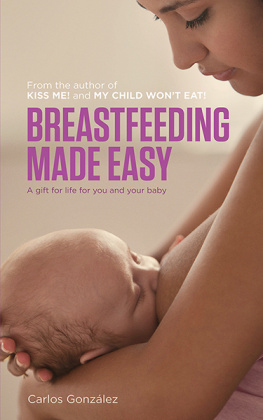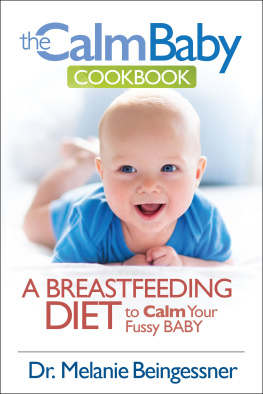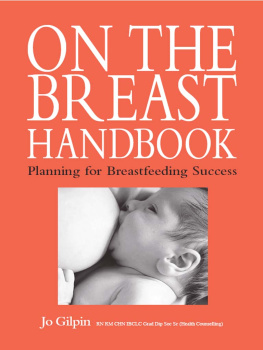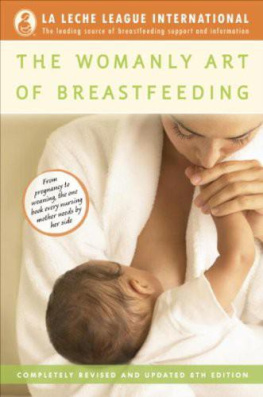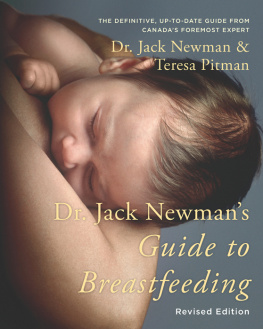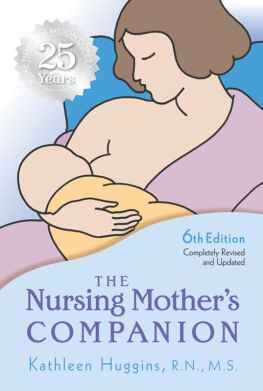APPENDIX I
Breastfeeding and the Law
Legal issues intersect with a babys right to be breastfed in a number of areas. Well discuss public nursing, custody conflicts, and extended breastfeeding here. Employment issues are covered in . Should you encounter problems in any of these areas, you may want to contact your local La Leche League leader, who should be able to offer some help in handling legal issues surrounding breastfeeding. To get the name of a local leader, first look under La Leche League in the white pages of your telephone directory. If you need further help, contact the main office of the league (youll find their phone number and website in the Resource Appendix) or a lactation specialist.
Breastfeeding Laws by State
Why are laws to protect a womans right to breastfeed necessary? Not because it is illegal anywhere to nurse in public, but because some peoplefortunately, a minorityconsider it indecent exposure and therefore criminal behavior. A major irony is that in many cases the harassed nursing mothers breasts are not even visible, and people who complain about her are simply uncomfortable with the very idea of breastfeeding. As attorneys Kenneth A. Friedman and the late Elizabeth N. Baldwin have written, Most mothers who are harassed for breastfeeding are trying hard to be discreet. Although nothing shows, everyone knows what she is doing. These new mothers, breastfeeding for the first time in public, are often the ones who are picked on. [These mothers] are more likely to wean as a result of embarrassment and humiliation.
At this writing, forty-four states, the District of Columbia, and the Virgin Islands have laws whose language specifically permits women to breastfeed in any public or private location. Twenty-eight states, the District of Columbia, and the Virgin Islands exempt breastfeeding from public indecency laws. Florida law specifically states, A mother may breastfeed her baby in any location, public or private, where the mother is otherwise authorized to be, irrespective of whether the nipple of the mothers breast is uncovered during or incidental to the breastfeeding. Connecticut law protects breastfeeding as a mothers civil right and stipulates that no person shall restrict or limit the right of a mother to breastfeed her child.
State laws are not uniform and most are not comprehensive, and theres a need for a national policy that will synthesize them all.
In very rare circumstances, you may need an attorney to help defend your right to breastfeed. These circumstances can include challenges to your right to breastfeed in public, custody conflicts, charges of abuse, or instances in which a conflict at work may result in job loss or a need to file suit. Each case, of course, is unique and has to be dealt with on its own merits.
We need to protest every case of discriminationafter all, bottlefeeding mothers are not asked to feed their babies in private. We need to rally community support. And we need to make the point that breastfeeding is never illegal. We also need to see mothers nursing in public more often, so that young people seeing them will accept this as the natural way to feed infants, an attitude that will serve the next generation of babies. If women are not made to feel as if they have to hide when theyre doing the best they can for their babies, more women will follow suit.
Remember that the law is often no more than a reflection of society-wide values and customs. As our culture becomes increasingly more nursingfriendly, many of these conflicts will cease to pose problems.
Protecting Your Nursing Baby in a Custody Case
Family breakups can occur while small children are still being nursed, and sometimes the nursing becomes an issue in custody conflicts. If you are involved in such an issue, whether with the babys father (the term we use thoughout these appendixes) or any life partner, you need to address it firmly and reasonably, and whenever possible, by settling your disputes out of court.
Some judges pursue the laudable goal of promoting bonding between a child and a noncustodial father by mandating a certain number of hours or days of visitation with the father, away from the mother. Judges do not always take into account that a child is still nursing, and in some cases have ordered that breastfed infants spend the weekend, a week, or even longer with their fathers, ignoring the nursing relationship.
Judges who dont know much about breastfeeding often think that as long as the baby gets her mothers milk, separation from her mother doesnt matter. They think that an easy solution would be for the mother to express enough milk for the visit and send the required number of bottles with the baby. This solution does not take into account the loss of physical closeness and the cherished sense of comfort that both mom and baby derive from the breastfeeding experience.
In any such scenario, you need to prepare well and you need to have good, competent legal advice. Many times, it is essential to show not just the importance of breastfeeding, but the current recommendations regarding breastfeeding. You could inform the court of WHO and UNICEF recommendations that all babies be breastfed until age two or beyond, and the recommendation of the American Academy of Pediatrics that all babies be breastfed for a minimum of 12 months, and then after that for as long as it is mutually desirable.
Often its helpful to show the judge in your case that you are your childs primary caretaker. Make sure to tell your attorney all the ways you care for and nurture your child so that he or she can help to prove this.
Its most important that you make the court understand that breastfeeding is not incompatible with your childs bond with her father. Unfortunately, many in the legal field mistakenly think that they have to give preference either to the father or to breastfeeding. It may be helpful to create a schedule that gives your baby maximum time with her father while not endangering the course of breastfeeding. When you plan this schedule, keep in mind that, sooner or later, your baby will be sleeping through the night. Suggest that when that time comes, she can join her father for an overnight stay.
Its well worth making the effort to work with your childs father. Even if he is uncooperative and unpleasant, you need to be reasonable, polite, and informative. You may want to do some or all of the following:
First, explain to your childs father that youll encourage his bond with your child because you know thats best for the child (only, of course, if this is actually the case). Refrain from angry words and name-calling.
Decide what you want and try to come to an agreement before you file any papers with the court. If you and the father cant agree, meet with a counselor or a mediator.
Develop a visitation plan that provides for frequent contact between your child and her father, while still respecting your childs breastfeeding needs.
If you absolutely cannot work it out yourselves, providing expert evidence may be essential to prove the importance of breastfeeding specifically regarding your child. Obtain testimony from your pediatrician, a psychologist, a lactation consultant, or some other authority.
Breastfeeding an Older Child
Over the past several years, a few rare instances have arisen in which social service agencies have questioned the propriety of extended breastfeeding. A mothers decision to breastfeed her child beyond age one or two may give rise to an accusation that she is enmeshed, or too entangled in her childs care, or is nursing for her own neurotic reasons, or is using breastfeeding to keep her child away from his father. However, no court has ever upheld a finding that extended breastfeeding constitutes abuse or neglect, or is in any way harmful to the child, regardless of the age of the nursing child.


